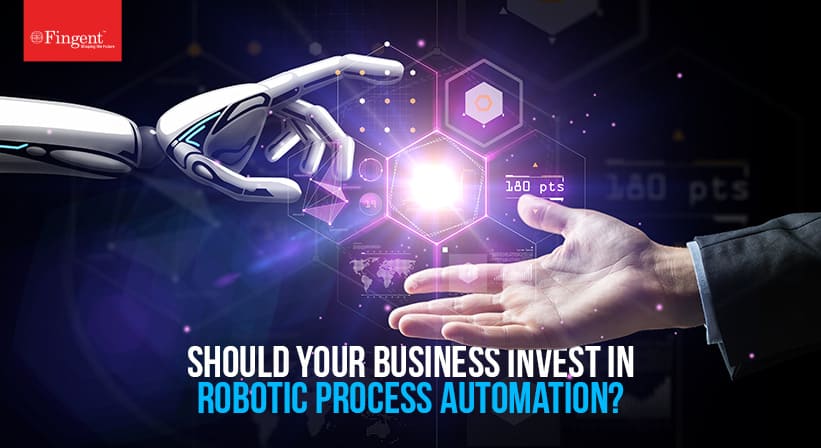Should Your Business Consider Transforming With RPA?
It apparently took 20,000 to 30,000 men to lay 2.3 million blocks to build the pyramid of Cheops, and it would have taken approximately 20 years to complete if the stones were laid at the rate of one every two minutes. Manual labor – tedious and time-consuming! Thanks to Robotic Process Automation (RPA) technology, most businesses can now be liberated from arduous work and improve their business process to gain increased profit.
Robotic Process Automation technology is bolstering businesses across industries. Software robots do repetitive and lower-value work and advanced robots can even perform cognitive tasks like interpreting the text, understanding unstructured data, and plying advanced ML models to make complex decisions.
Are you a business leader considering whether to move to RPA or not move to RPA? This blog can clarify any doubts you may have about RPA.
But what exactly is RPA?
What is RPA?
Robotic Process Automation is a software technology that is capable of imitating human actions while interacting with digital systems and software. Like us, it can understand what is on the screen and perform a wide range of defined actions. The only difference between us and RPA is that software robots can accomplish tasks faster and more consistently than we can ever do. Plus, they don’t need to stretch or go for a coffee break.
How RPA Is Impacting Today’s Businesses
Robotic Process Automation is a clear and viable way to maximize efficiency, reduce costs, and enhance productivity. Though RPA is fairly new, it is gaining rapid traction across industries. Businesses are turning to RPA to minimize human effort.
According to a Deloitte RPA survey, 53% of respondents have begun their RPA journey by 2020, and this is expected to increase to 72% in the next couple of years. Why are so many companies adopting RPA? Here are a few reasons:
- Employees spend 10%-25% of their time on repetitive tasks. Implementing RPA will save that time for more productive work.
- Typical rule-based processes can be automated by 70% – 80%.
- IT departments of an organization spend 30% of their time on basic low-level tasks. Obviously, RPA adoption can save precious time for the IT department, which can be better used elsewhere.
Why Your Business Needs RPA?
RPA is a user-friendly and cost-effective tool. The advantages it can provide are drawing interest from organizations from various sectors globally. Here are some business benefits for your consideration:
- Easy implementation: RPA implementation does not require programming skills. Non-technical staff can teach the bot how to perform an automated task with the help of a process recorder feature.
- Less prone to make mistakes: RPA bots are extremely accurate and consistent. They are less prone to typo errors than a human worker. This feature is extremely beneficial in tasks such as setting up or removing user accounts, onboarding and offboarding employees or filling out information from another system.
- Meet strict compliance standards: Once configured, RPA bots strictly follow the step and provide an audit trail for each step. This controlled nature is well suited for companies that want to automate their processes end-to-end while meeting regulatory compliance standards.
- Work with existing systems: RPA doesn’t require any changes to your current system. It can be included as part of your automated business process.
- Increased productivity: RPA improves process cycles and completes them faster when compared to manual processes.
Read more: Is It the Right Time for Your Business to Invest in Robotic Processing Automation?
Now that you know why your business needs Robotic Process Automation, would you like to know what some potential areas of your business that can effectively implement RPA are?
Potential Business Areas to Implement RPA Effectively
Here are some sectors that use Robotic Process Automation effectively:
1. Report Generation: Report generation is a time-consuming and tedious task as data must be collected from multiple sources and collated accurately. RPA takes care of this task allowing employees to directly get to drawing actionable insights from the collated information.
2. Customer Service: RPA can be set up to quickly handle the first two or three customer interactions before reaching a human executive.
3. Accounting: RPA helps increase the speed of accounting, such as on-time invoicing and quicker fund release. You can fine-tune it to ask the vendor for relevant documents in case of any complexity.
4. Fraud detection: RPA enables banks to detect any anomalies in transactions and flag them against a fraudulent customer. It can reduce the time taken for fraud detection and investigation.
5. Data exchange: Data exchange is often time-consuming and error-prone. RPA can maximize productivity by reducing transaction times from hours to minutes. It can also minimize errors and maintain clean and organized data for business compliance results.
6. Reduce cost and manual labor: RPA limits your labor expenses and increases productivity. This contributes to consistent work. It also reduces errors at work, which prevents time wasted on correcting errors and redoing the work. Thus, it is more cost-effective while minimizing manual labor.
Top Sectors That Can Benefit From RPA
- Property management: Real estate businesses can use RPA to generate invoices automatically regarding property management. It can also reduce the turnaround time, leading to reduced operational costs.
- Retail: These businesses can use Robotic Process Automation to monitor inventory and email sales. It allows retail businesses to monitor competitors’ websites to gain insights on products or customer service.
- Finance: Finance companies can use RPS to manage customer accounts, data migration within accounts, sending and receiving payments, and more.
- Healthcare: Manually recording patient data and updating it can take enormous time. You can automate this process through RPA to reduce workforce concentration. Also, you can leverage these insights to provide more personalized healthcare services.
Read more: Deploying RPA for Finance, Healthcare & IT Operations
Tips To Choose The Right RPA Partner
Once you have your strategy in place, consider these points in choosing the right RPA partner:
- Skills: What skills or certifications matter to you most?
- Bots: What kind of bots do you need for your strategy?
- Capabilities: Do these bots have the cognitive capabilities to handle unstructured data sources?
- Recorders: Does your provider have tools to record workflow?
- Scalability: Can your partner scale as per your requirement?
- Solutions: Are their solutions reliable?
- Reusability: Does your partner follow a modular automation approach?
- Process designer: Can your partner provide you process designer approach that suits your business?
- Cost: Find out upfront if the cost includes licensing, ongoing maintenance, and support.
Read more: Robotic Process Automation: Choosing The Right Solution For Your Business
Ready to Transform Your Business With RPA?
Given the apparent advantages of Robotic Process Automation is one of the best tools to adopt in the current business world. However, selecting the right RPA partner can be a demanding process. Do your due diligence, speak with our experts and see what exactly you need to be looking for and if we are a good fit for you.
Once implemented, you can be confident that your business will benefit from better results and improved efficiency, which translates into higher revenues.
Stay up to date on what's new

Recommended Posts

09 Jan 2023 B2B
5 Advanced Technologies Inevitable For Your Business Today
The strategic significance of advanced technologies as a critical business component is recognized by enterprises like never before. Besides business modernization and cost reduction, advanced technologies allow you to compensate……

04 Oct 2022 B2B
5 Advanced Business Technologies You Should’nt Miss Out When Strategizing Brand Value and Competency!
The strategic significance of advanced technologies as a critical business component is recognized by enterprises like never before. Besides business modernization and cost reduction, advanced technologies allow you to compensate……

11 Jun 2022 B2B
Improving Business Performance With Augmented Intelligence!
Augmented Intelligence has presented enormous potential in several sectors. Enterprises are adopting Augmented Intelligence to gain the best outcomes. After 2 years of disruption, partners, employees, and customers increasingly expect……

04 Mar 2022 B2B
Deploying RPA for Finance, Healthcare & IT Operations
Robotic Process Automation (RPA) is not just a “nice-to-have” option anymore. If you want to remain competitive it is an absolute necessity. As a most promising technology enabler, RPA helps……
Featured Blogs
Stay up to date on
what's new






















































